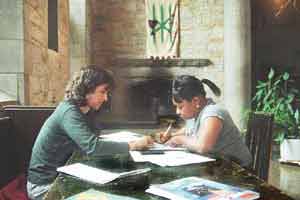NORC survey finds Americans practice what they are preached
By William HarmsNews Office
 University Church, at the corner of University Avenue and 57th Street in Hyde Park, houses the Blue Gargoyle Youth Service Center, which offers classes in reading and mathematics. Volunteer literacy tutor Bonnie Kanter and her student Debora Washington meet for a tutoring session. The program draws volunteers from the congregation, area residents, and University students, faculty and staff. |
In the survey, the first national study ever conducted to measure altruism and empathy, NORC found that while people who never attend religious services perform on average 96 acts of helping others, people who attended religious services weekly and take part in other religious activities report performing 128 acts of kindness.
The study asked about 15 different acts of altruism, including talking with someone who is depressed, helping with housework, giving up a seat to a stranger, giving money to a charity, volunteering, helping someone find a job, or helping in another way, such as lending money. The connection between religious observance and charitable behavior was consistent across religious groups in the study, “Altruism in Contemporary America: A Report from the National Altruism Study”.
Before he began the survey, author Tom Smith, Director of the General Social Survey at NORC, expected to find that people who are more socially involved, as well as those who support spending on social welfare programs, would be more likely than others to be altruistic. Those attitudes made little difference, however, in predicting who would be more charitable.
There also were no major demographic differences. The study disputes the idea that people in small towns are more likely than people in big cities to perform acts of kindness. The size of a person’s community had no relationship with the number of times a person acted in kindness.
“The connection between good deeds and religion probably indicates that people are reflecting the religious teachings of charity that are central beliefs of most major religions,” Smith said.
“For most religions, an important part of the belief system is an admonition to love other people and to do good deeds. The people who attend weekly services hear that quite a lot.
“Also, people in a religious congregation are nested in a community that provides them with opportunities to do good deeds and reach out to others,” he said.
Altruistic values promote actions that consider another person’s needs rather than one’s own. Those deeds benefit the recipient, but they do not benefit and may even generate costs for the person performing the altruistic act.
The report found that acts of kindness consistently increased with the number of times people attended religious services. Other measures on the survey also underlined the role of religion in promoting altruism. People with strong religious faith and who prayed daily were more likely to help others.
The altruism research, which was conducted in 2002 as part of NORC’s General Social Survey, asked people about their feelings on a wide measure of empathetic values, such as having tender feelings toward others, being disturbed by other people’s misfortunes and wanting to protect people who are vulnerable.
On many attitudes and values the General Social Survey shows little difference in the views of men and women. However, the altruism research showed a large difference between men and women on questions related to empathy, with women being much more empathetic. For example, while 46 percent of the women surveyed reported feeling disturbed by other people’s misfortunes, only 25 percent of the men shared that perspective, Smith found.
The questions about altruism were supported by the Fetzer Institute as part of the General Social Survey, an in-person survey of a representative sample of Americans 18 and older. It is conducted every one to two years with support from the National Science Foundation.
The altruism questions were asked of 1,366 people.
![[Chronicle]](/images/sidebar_header_oct06.gif)